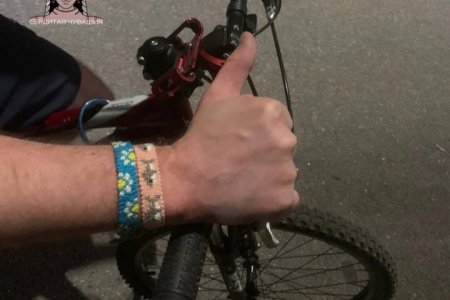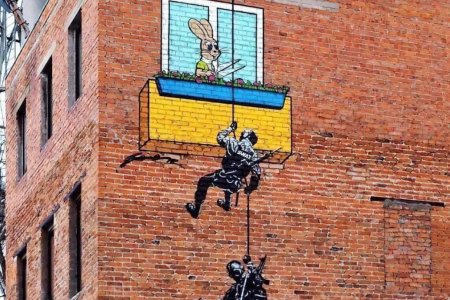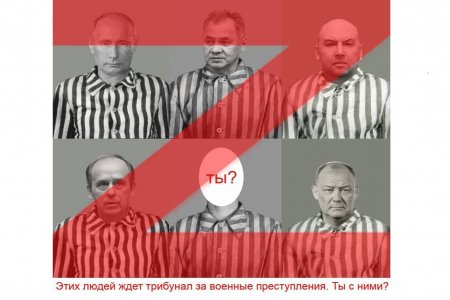
One of last week’s major media events was the premiere of Andrei Loshak’s “Broken Ties” . The film talked of the split in Russia between generations and within families and how attempts to express anti-war views led children to leave home and husbands and wives to divorce.
The film’s protagonists talked about guilt, responsibility, their own activism and attempts to overcome the incomprehension of their parents. “Broken Ties” also showed the strength of propaganda and the people who succumbed to it. The film was broadcast on the “Nastoyashchee vremya” (Current time) channel and quickly clocked up more than a million hits.
*
On 23 June, the Riga-based website Meduza [E][1] published a lengthy guide [E] explaining how people living in Russia could engage in current anti-war activities. Taken together anti-war channels on Telegram, Meduza estimated, had one quarter of a million subscribers and, according to their information, the number was growing. There follows a brief summary of the projects mentioned in the guide.
*
Among the major anti-war projects is “Media partisans”. Its activists think up convenient and helpful formats for materials, support decentralised peaceful protest, write instructions to ensure the safety of protestors and manage bots that gather anti-war graffiti, placards and flyers.
One of the “Media partisans” projects is the Telegram bot “Crafty partisans” which leaves commentaries in support of celebrities who have spoken out against the war and makes calls on those who are undecided.
*
The Vesna (Spring) movement has organised numerous protests and launched the “Vidimy Protest” (visual protests) Telegram channel which brings together all of Russia’s anti-war “street art”. Its activists have already suffered for their activities and federal warrants have been issued for their arrest. The posts on the “Vidimy protest” channel showed the vast scale of such quiet anti-war protests and their geographical extent: people sent in photos from large and small population centres across the country. The movement also launched public campaigns to revoke the law about “fake news”and to impeach Putin.
*
“A call to conscience” an anti-war campaignin which lawyers and rights activists (see preceding digest) helped young people to file effective legal appeals against their participation in military operations.
*
The “media resistance group” sent out legal advice to those working for State-funded organisations.
*
“Ways of resisting” a podcast about the anti-war resistance in Russia. Its authors were trying to reach listeners beyond the information bubble of the activists.
*
The “Wake up!” project brought together useful articles and guides about the methods of non-violent resistance and the stories of particular activists in order to support and inspire the anti-war community.
The Latest Initiatives
In March this year, an anonymous channel appeared on the Telegram messaging platform. Called “Stop the trains!”, it was started by activists who call themselves the “railway resistance to the war”. They called on Russian citizens to sabotage strategic railroads in order to halt or delay the transport of military equipment, fuel and ammunition to the war zone.
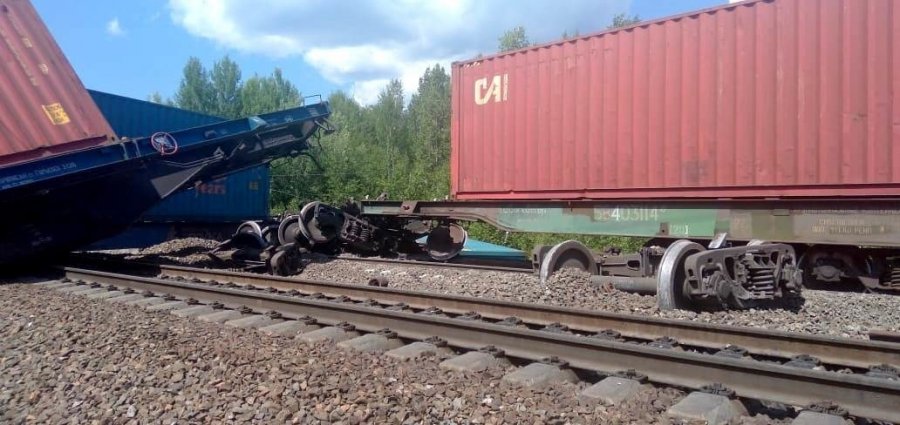
Another site (ostanovivagony.com) carried a map of the key railway hubs and military airfields through which military supplies were being transported to Ukraine. At first its authors called on activists to short-circuit the automated equipment on the railroad between stations. Later they published more radical proposals, from the destruction of relay cabinets and stoplights to the derailing of trains and waggons. The authors insist that their resistance was peaceful and non-violent; no one had been injured, they said, as a result of the partisans’ activities.
The authors claimed responsibility for the derailing of freight waggons in Central Russia (Smolensk Region and the city of Yaroslavl); in the Urals near Ivdel and Kamensk-Uralsky (Sverdlovsk Region); on the railway between the Rostov Region and the Kuban (southern Russia); in Pskov (Northwest Russia); in the Rybinsk and Birilyussky districts of the Krasnoyarsk Krai (central Siberia); and all over the Volga Federal District – in Tatarstan (the Aeroport station on the Kazan branch of the Gorky railroad); the Alsheyevsky district in Bashkortostan;the Ulyanovsk Region; and at Novotroitsk and Orenburg (Orenburg Region).
Organised groups of partisans were active in half of Russia, the railroad resistance claimed; a less organised resistance was to be found in the rest of the country.
*
In early May the Russian authorities managed to block the first resistance channel on Telegram with its 2,500 subscribers. Whereupon a new channel was created. At present the new channel has attracted more than 12,000 participants. The channel’s owners believe that the Russian authorities will again try to block it, using an army of bots to attack it.
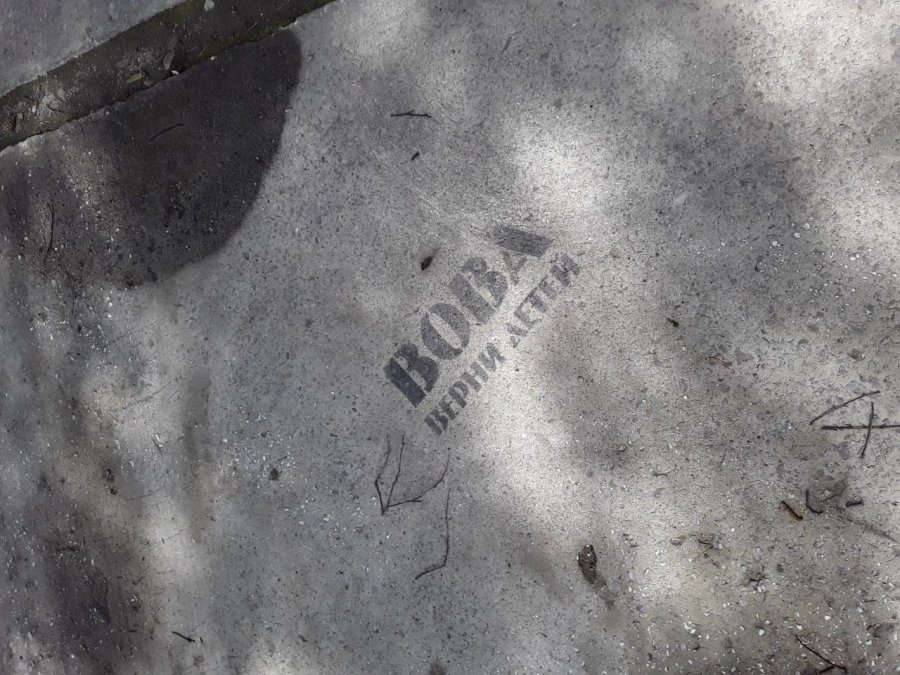
This Week’s News and Protests
One of the most popular bands in Russia today is “Little Big”. They have just released a new single with an anti-war theme, “Generation Cancellation”. “The war has not ended,” said the musicians in the accompanying clip. “Stop the war in Ukraine. Stop war throughout the world. No one deserves war.” Immediately after the clip’s release, Little Big’s musicians announced that they had left Russia and were now working in the USA.
*
Some while back, “Simple Coffee”, a popular network in the Urals largest city, Yekaterinburg (2012 pop: 1.4 million), published an anti-war declaration on its site:
“We do not support the war and want to remind you that any military action inevitably leads to victims among ordinary people. […] Today we have seen that our modern, peaceful life can easily be changed. We hope that politicians will reach agreement and end the war.”
The declaration remained on the website for several months. On 26 June, supporters of the Kremlin’s TV propagandist Vladimir Solovyov noticed the text and began a campaign against the network.
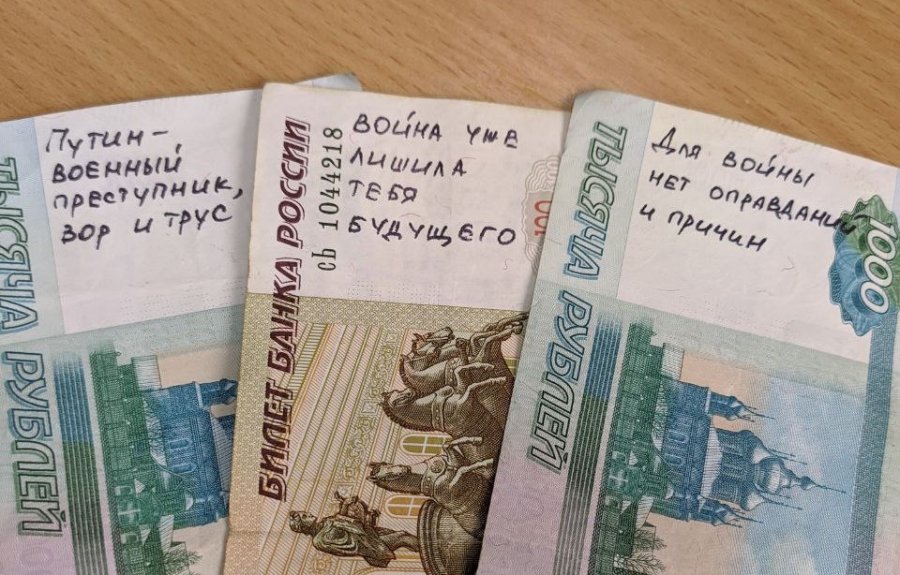
*
Activists in Yaroslavl (Central Russia) set up a newspaper about events in Ukraine. The first issue of partisan gazeta carried an interview with a former TV journalist about propaganda in Russia’s State-controlled media. The newspaper’s authors laid out the text in such a way that readers could reprint and distribute it in any other town or city. Travel-blogger Alexander Pototsky founded the newspaper.
*
Alexei Gorinov, a local council deputy in Moscow, held a one-man demonstration against the war in the capital’s Tver district court. He was on trial for spreading “fake news” about the Russian army and was standing in the court’s “aquarium”, the glassed-in cage for the accused, when he made his protest.
Since 27 April 2022, Gorinov has been held in a pre-trial detention centre. At a meeting of deputies earlier in the year he said it was improper to celebrate Victory Day (9 May) [E] in 2022 in view of the war in Ukraine. The case was heard behind closed doors.
*
As described in the previous digest a district head in the Pskov Region banned the decoration of public buildings with the letters Z and V.[2] Sophia Pugachova, head of the Norvezhsky district (Pskov Region, NW Russia) declared that such symbols were inappropriate and divisive in the run-up to Russia Day (12 July). Pugachova, candidate of the opposition Yabloko party, was elected in 2019. Local deputies have already complained to the prosecutor’s office about her statements and actions.
*
Alyona Podlesnykh, an activist in Perm (Volga Federal District), succeeded in having a Z-banner removed from the army Officers’ Club. She appealed to the Inspectorate for the Protection of Sites of Cultural Heritage (Perm Krai), and it agreed that no one had sought permission to hang the banner on the façade of that historic building. Inspectorate officials demanded that the banner be removed “without further delay”.
*
Dmitry Chernysh held a solitary, anti-war picket outside the Kazan Cathedral in St Petersburg. He was protesting against a depiction of the late Victor Tsoi, singer with the Kino band, wearing the uniform of a Russian Z-soldier (it was one of several created by the artist Alexei Sergiyenko). Chernysh stood by the banner carrying a placard reminding passers-by that Tsoi deliberately mutilated himself in order to avoid military service.
*
In Rostov-on-Don Sergei Samarsky held a one-man picket on 21 June carrying a placard which read, “Halt the special military operation”, outside the Rostov Regional administration building (South Russia). He was arrested and given 13 days detention for failing to obey the police and a 50,000 rouble fine for discrediting the Russian army.
*
An activist in Ivanovo drove round the Central Russian city playing anti-war music. Dmitry Silin’s playlist included songs by Dead Leg, The Soldiers of the ‘Centre’ group, Vladimir Vysotsky and Igor Talkov’s song “I shall return”. This spring Silin handed out more than six hundred copies of Orwell’s Nineteen Eighty-Four and Animal Farm in Ivanovo, as well as Lev Tolstoy’s novella Hadji Murat (1912) [about Russia’s19th-century war in the Caucasus mountains].
Silin and other activists then began to wear tee-shirts bearing a quotation from Nineteen Eighty-Four, “Freedom means the right to say that two plus two makes four”, after which they were summoned to a police station.
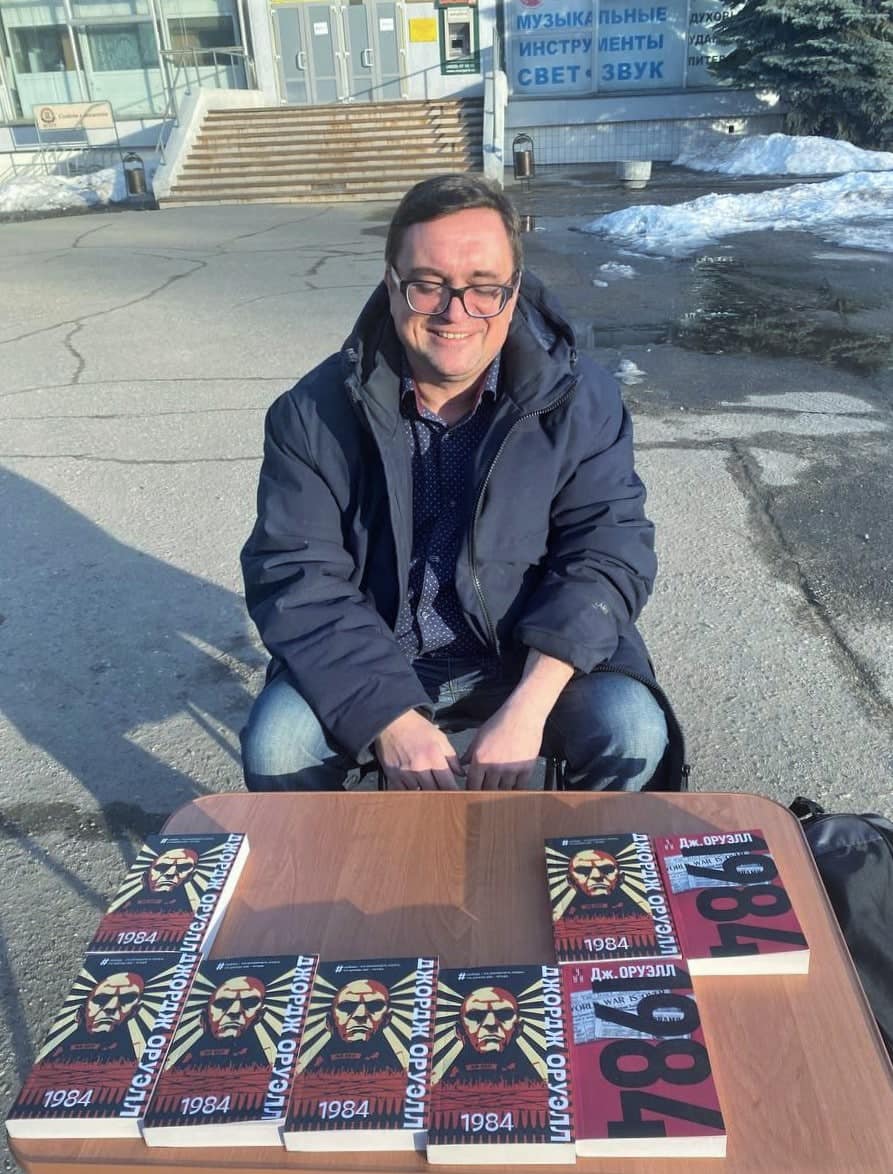
*
Inhabitants of Cheboksary (Chuvashia, Volga) broke a Z sculpture and were arrested by the police. On the morning of 17 June young men struck the illuminated letter Z on the city’s main pedestrian thoroughfare several times. Their deed was captured on CCTV. The city’s mayor, Denis Spirin, announced that the lads would be fined and added to the register of offenders.
Another Cheboksary resident earlier gave the letter a kick; the court fined him 30,000 roubles.[3]
Harrasment and Persecution
Anti-war statements and activities continued to attract harassment and persecution. During the past week certain activists were arrested for posts they had made on social networks back in February and March this year. Charges were brought that could lead to fines or terms of imprisonment. Others were forced to leave their jobs.
Fines for discrediting the RussianArmy were imposed in towns and cities all over the country: in the Volga District (Cheboksary and Nizhny Novgorod), Central Russia (Kovrov and Yefremov), in Moscow and St Petersburg, Northwest Russia (Petrozavodsk, Kaliningrad, Pskov and Arkhangelsk), Siberia (Novosibirsk and Novokuznetsk) and the Urals (Cheremukhova and the Khanty-Mansiisk Autonomous Okrug) and in the North Caucasus (Nalchik, Vladikavkaz, Maysky and Zheleznovodsk) but most reports were recorded in conservative South Russia – in the city of Volgograd, and the towns of Volzhsky, Ilovla, Uryupinsk and Semikarakorsk (Volgograd Region); in the towns and cities of the Krasnodar Krai (Novorossiysk, Krasnodar, Belorechensk, Goryachy Klyuch, Tuapse and Sochi) and in the administrative centre of the Southern Federal District, the city of Rostov-on-Don and the town of Azov.
The fines varied in size from 15,000 to 80,000 roubles. They were imposed for posts on social networks, conversations with colleagues at work and with casual acquaintances, sticking up flyers, writing anti-war graffiti and comments on pro-war banners, solitary pickets, speeches by lawyers defending those accused of administrative offences, displaying an anti-war poster during a lesson at school about “patriotism”.
Investigations into the administrative offence of discrediting the army were launched in Zelenograd (Moscow Region), in the North Caucasus (Vladikavkaz and the Stavropol Krai), in the Urals (Chelyabinsk and Yekaterinburg) in Northwest Russia (Arkhangelsk, Pskov and St Petersburg), in Rostov-on-Don (South Russia) and in Moscow and Tambov (Central Russia).
People were arrested for holding anti-war pickets in Moscow, Yekaterinburg, Rostov-on-Don, Arkhangelsk and St Petersburg.
*
The Kirov district court in the city of Omsk (west Siberia) fined activist Richard King 30,000 roubles for displaying a poster that read “No to Nazism”. He was convicted of discrediting the Russian armed forces.
During the trial King tried to prove that he was opposed to war in general, without application to any specific country. A policeman called as a witness replied that “the only war in Russia now is the ‘special operation’.”
*
A Moscow University student was arrested at her graduation ceremony after she wore a tee-shirt in support of Dmitry Ivanov. Ivanov had also just finished his degree course and was arrested for circulating “fake news” through his “Moscow University protests” Telegram channel. He was unable to take his final exams and defend his thesis because he was first detained and then remanded in custody.
Persecution of the Media; Blocking of Websites
At the request of the Prosecutor-General’s Office, Roskomnadzor (the Media Oversight Agency) blocked the Impeachment 2.0 website set up by the Vesna movement. The site helped people send appeals to State Duma deputies in order to secure Putin’s resignation and to put an end to the war in Ukraine. By the time the website was blocked, Vesna said, it had forwarded more than 19,000 appeals to the State Duma.
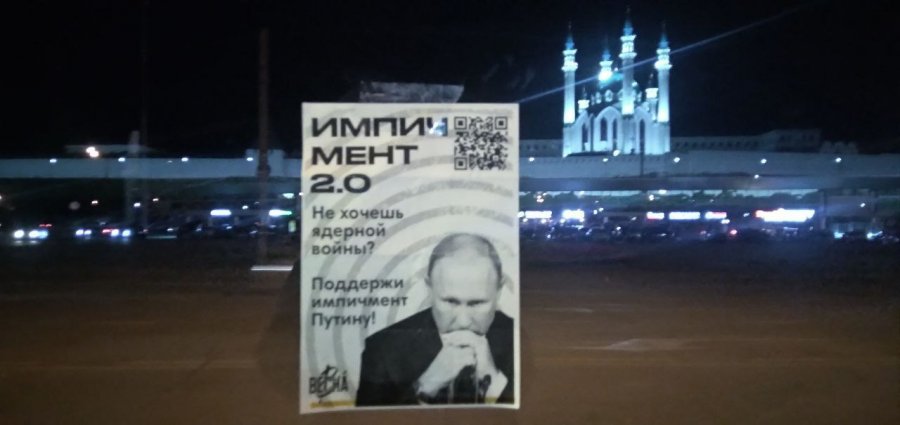
*
In St Petersburg, the Kirov district court ruled that circulating information about Russian army losses in Ukraine was prohibited. The Russian-language version of Radio France Internationale and a page in the Belorussians and the Market publication had both carried such information. Earlier a court in the Kaliningrad Region issued a similar ruling about the publication by the Pskov website 60.ru. of lists of Russian soldiers who had died in Ukraine.
*
The Avtozak Live media project announced that it was closing its network of correspondents in Russia because of the risk of criminal prosecution.
“We put off this moment for some time but now it is growing more dangerous each day to write about the war and related events. A part of our team has left the country; those who have remained behind are no longer working with us,”
commented Maxim Kondratyev who set up the project.
*
Roskomnadzor restricted access to the website of the British newspaper The Daily Telegraph. Only one article was entered in the register of prohibited information [E]–https://www.telegraph.co.uk/world-news/2022/02/23/russia-deploys-mobile-crematorium-follow-troops-battle/–.It suggested that the Russian army was getting ready to use mobile crematoria and these could help conceal military losses. The decision to block the website was taken in April but only implemented on 20 June.
Other Forms of Harassment
Stand-up comic Denis Chuzhoi has left Russia after receiving a number of threats. On 16 June he published a video on YouTube in which he played a recording of his conversation with a man who threatened that he would “fly in, dammit, on one of our fucking fully-equipped Russian helicopters” and sort him out. Since the war in Ukraine began on Thursday, 24 February, Chuzhoi made regular anti-war appeals.
*
The Open Space gallery in Moscow announced that it was putting a halt to its activities because of pressure from law-enforcement officers. “We still don’t understand what they want from us and how things will unfold from here on,” said the project’s Telegram channel, “so the Open Space in Moscow will be taking a break.” On 14 June, the police came to the exhibition of works by prisoners (see early June digest) and confiscated a number of paintings. Later the police searched the homes of activists and volunteers who were working with the gallery.
*
Moscow’s popular Glavclub venue issued a statement that the authorities had pressured it into cancelling shows by Anacondaz, the singer Maniga and the band Accident, musicians who have all spoken out against the war in Ukraine. At Glavclub they said they’d received phone calls from various officials, and on Friday, 24 June, were informed that Rospotrebnadzor (the Consumer Oversight Agency) and the Ministry for Emergency Situations would be carrying out a series of unscheduled inspections. “We tried, sorry,” ended the message to the club’s supporters.
*
An engine-driver in South Russia (Krasnodar) was forced to leave his job after refusing to drive a train bearing the letters Z and V. Alexander Shabanov’s employers asked him to write a letter of voluntary resignation. Shabanov says he was threatened with “vengeance” by his fellow workers if he complained about his employers to the police. Earlier a court fined the engine-driver for discrediting the Russian army. He had posted anti-war clips on YouTube and his fellow workers informed on him to the police.
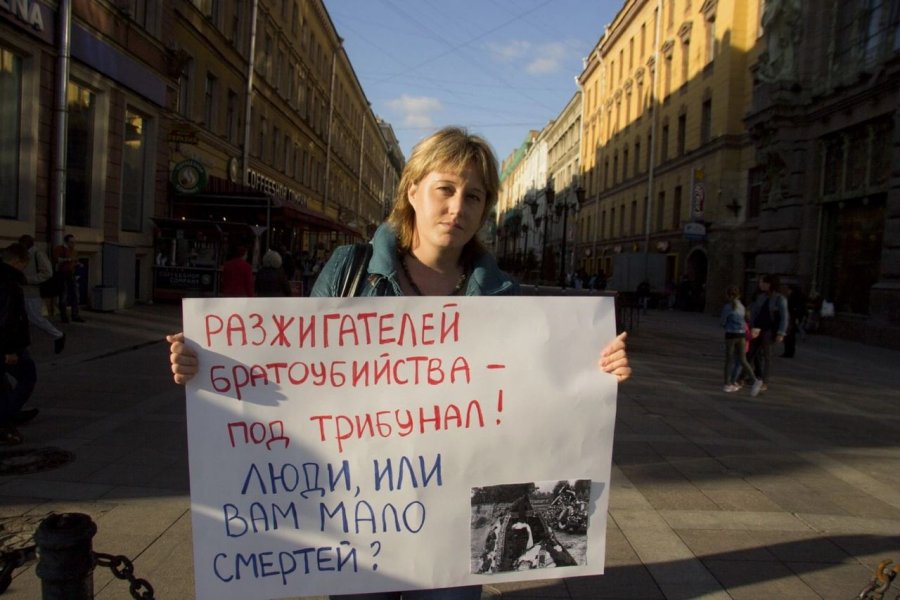
*
Sergei Medvedev described the threats and harassment to which he was being subjected. “Death to traitors. Za!!! Mir [for peace]” was written on the door of the activist’s apartment in Volgograd (South Russia). He had also received threatening letters. The author of one letter said he worked with law-enforcement.
*
In Crimea it was decided that a garage should close after refusing to repair a military truck bearing the letter Z. The garage owner Vilen Seitosmanov claimed in a video appeal that he had not rejected the truck because of the letter Z but because the garage did not have the right equipment. He also mentioned how he was harassed on social media because of old photographs on Vkontakte which displayed the Ukrainian flag.
*
In the town of Kargopol (Arkhangelsk Region, NW Russia) two charges were brought against a former deputy of the town duma in response to a denunciation by a local inhabitant. Ex-deputy Radik Adnobayev posted his own photo holding a placard “No to the war” on the Vkontakte social network. He was denounced by someone with whom he formerly came into conflict: on social networks the man named Radik “a traitor to the Motherland”. During their exchanges Adnobayev replied, “Glory to Ukraine. Glory to the heroes!”
Тhis digest was prepared by Memorial volunteers drawing on the following sources: the OVD-Info and Kholod websites, and the “Visual Protests” and “Activatica” Telegram channels.
Translation, John Crowfoot
[1] All links are to Russian-language sources, except for those marked [E]. In this issue they are Meduza, Memorial and The Daily Telegraph.
[2] Аccording to one of the versions, the letter Z refers to the Russian word ‘For’ as in “for Russia!” (За Россию); the letter V represents the English word and two-digit signal “Victory!”
[3] In notional terms, this represents 545 US dollars. According to official figures of the RF Ministry of Economic Development it was half the average monthly salary of 62,269 roubles (April 2022).
